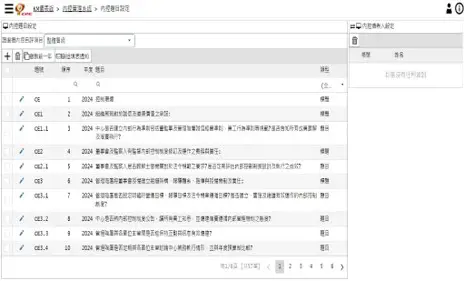Internal Audit Policies and practices
To maintain the effectiveness of the internal control system, the CPC follows the law and regulations stipulated by the Foundation Act and adheres to the “International Professional Practices Framework” published by the Institute of Internal Auditors. CPC established the “China Productivity Center's Internal Audit System” following the prescribed procedures on the 28th of October, 1997. Additionally, the system was revised for the third time in accordance with adjustments to relevant laws and regulations and announced for implementation on the 20th of September, 2019.
Internal Audit Responsible Unit
At the same time, an internal audit responsible unit reporting to the Board of Directors has been established, with a lead auditor who has over 10 years of experience in auditing and internal audit and holds an international internal auditor qualification. Additionally, a dedicated audit team leader, who also holds a professional certificate in internal control, supports the lead auditor. This structure aims to maintain the professionalism and credibility of the audit function. Through a sound internal audit unit, characterized by an independent spirit, professional attitude, and an objective stance, the goal is to assist the Board of Directors, Supervisors, and the General Manager in continuously maintaining the organization's proper operation.

Internal Audit Planning and Implementation
- Plan Development: Each year, based on the risk assessment results of the eight major control cycles and information management, an annual audit plan is developed. After approval by the Board of Directors and Supervisors, the audit operations are carried out. Additionally, specific audit projects are listed, and risk control measures are implemented during the operations.
- Audit Execution: According to the annual audit plan, routine or project-specific audits are conducted to verify that administrative and operational units are effectively implementing internal controls and that operational efficiency is reasonable. Improvement recommendations are made as needed, and the audited units are required to address these issues.
- Reporting Results: The Audit Office will disclose any deficiencies in the internal control system and anomalies found during the audit in the audit report and present them to the Board of Directors and Supervisors.
Material Topics Action Management Goal - Audit Office Professional Talent Cultivation
CPC shall follow the legal requirements and operational needs to establish a dedicated independent Audit Office under the Board of Directors and Supervisors, staffed with personnel holding professional audit experiences and certificates, who shall regularly report the audit results to the Board.
Internal Control Policies and practices
CPC understands that to achieve sustainable organizational operation, it is crucial to implement internal control objectives that ensure “operational efficiency and effectiveness,” “reliable reporting,” and “legal compliance.” In accordance with the laws and regulations stipulated in the Foundation Act and the internal control system principles issued by the Ministry of Economic Affairs, as well as to follow the “Internal Control-Integrated Framework” published by the COSO Committee, CPC established the “China Productivity Center's Internal Control System” on 30th of December, 2019. Following a revision to relevant laws and regulations, the first revision was made and announced to all employees on 11th of December, 2020, for adherence.
Internal control self-evaluation e-system with full employee participation
The approved internal control system is comprehensive and covers the 8 major cycles and information management control procedures unique to CPC.
Based on the organizational structure, responsibilities, and processes, the self-evaluation operations were digitalized by establishing an internal control self-assessment e-system in 2023. This system covers both the overall and operational levels. A total of 28 units (including administrative/business units at level one or above, or independent units) were executed, ensuring comprehensive coverage and effective implementation of the internal control processes in 2023.

Internal Control Evaluation
- Self-Evaluation: Each responsible unit conducts a self-evaluation at least once a year. The self-evaluation can be divided into two levels: overall and operational. The evaluation methods may refer to relevant internal control policies and authoritative guidelines. Any identified deficiencies in the internal control system, along with anomalies and improvement measures discovered by the audit unit, are communicated and reported to the appropriate levels of management, the Board of Directors, and the Supervisors.
- Internal Audit: The internal audit responsible unit, which reports to the Board of Directors, is responsible for detailed internal audit operations. The procedures and operations for internal audits are established by CPC's internal audit system.
- External Audit: As needed, external auditors are commissioned to review the design and effectiveness of the internal control system and its implementation, and to recommend improvements to ensure the system operates effectively.
